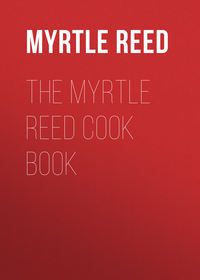 полная версия
полная версияMaster of the Vineyard
"Me neither," Matilda chimed in.
"She was wearin' lace on her petticoats and high-heeled shoes, and all her handkerchiefs was fine linen," Grandmother continued. "Maybe you'd like some lace ruffles under your grey alpaca, wouldn't you, Rosemary?"
The girl got to her feet blindly. She gathered up the dishes with cold hands that trembled, took them out into the kitchen, and noiselessly closed the door. Her heart was hot with resentment, even though she had heard the story, with variations, ever since she was old enough to understand it.
"Poor little mother," said Rosemary, to herself. "Dear little mother! Why couldn't you have taken me with you!"
As Grandmother had said, for the hundredth time and more, Frank Starr had brought home his young wife unexpectedly. The surprise, in itself, was a shock from which she and Matilda had never recovered. Even now, they were fond of alluding to the years of ill-health directly caused by it, and of subtly blaming Rosemary for it.
An OrphanAt the end of the third day, the young couple had departed hastily, the bride in tears. A year or so afterward, when Rosemary was born, the little mother died, having lived only long enough to ask that the baby be named "Rosemary" – Rose for her own mother and Mary for Grandmother Starr.
Stern, white-faced, and broken-hearted, Frank Starr brought his child to his mother and sister, and almost immediately went West. Intermittently he wrote briefly, sent money, gave insufficient addresses, or none at all, and, at length, disappeared. At the time his last letter was written, he had expected to take a certain steamer plying along the Western coast. As the ship was wrecked and he was never heard from again, it seemed that Rosemary was an orphan, dependent upon her grandmother and aunt.
In their way, they were kind to her. She was sent to school regularly, and had plenty to eat and wear, of a certain sort. Every Spring, Aunt Matilda made the year's supply of underclothing, using for the purpose coarse, unbleached muslin, thriftily purchased by the bolt. The brown alpaca and brown gingham, in which she and her grandmother and aunt had been dressed ever since she could remember, were also bought by the piece. The fashion of the garments had not changed, for one way of making a gown was held to be as good as another, and a great deal easier, if the maker were accustomed to doing it.
Year after YearSo, year after year, Rosemary wore full skirts of brown alpaca, gathered into a band, and tight-fitting waists, boned and lined, buttoning down the front with a row of small jet buttons. The sleeves were always long, plain, and tight, no matter what other people were wearing. A bit of cheap lace gathered at the top of the collar was the only attempt at adornment.
The brown ginghams were made in the same way, except that the waists were not boned. The cheap white muslin, which served as Rosemary's best Summer gown, was made like the ginghams. Her Winter hat was brown felt, trimmed with brown ribbon, her Summer hat was brown straw, trimmed with brown ribbon, and her Winter coat was also brown, of some heavy material which wore surpassingly well.
For years her beauty-loving soul had been in revolt, but never before had she dared to suggest a change. The lump in her throat choked her as she washed the dishes, heedless of the tears that fell into the dish-pan. But activity is a sovereign remedy for the blues, and by the time the kitchen was made spotless, she had recovered her composure. She washed her face in cold water, dusted her red eyes with a bit of corn-starch, and put the cups and plates in their proper places.
Toiling CheerfullyShe listened half-fearfully for a moment before she opened the door, dreading to hear the dear memory of her mother still under discussion, but Grandmother and Aunt Matilda were wrangling happily over the hair-wreath in the parlour. This was a fruitful source of argument when all other subjects had failed, for Grandmother insisted that the yellow rose in the centre was made from the golden curls of Uncle Henry Underwood's oldest boy, while Aunt Matilda was equally certain that it had come from Sarah Starr's second daughter by her first husband.
Throughout the day Rosemary toiled cheerfully. She swept, dusted, scrubbed, cooked, did errands, mailed the letter which made certain another bolt of brown alpaca, built fires, and, in the afternoon, brought down the heavy roll of unbleached muslin from the attic. Aunt Matilda cleared off the dining-room table, got out the worn newspaper patterns, and had sent Rosemary out for a paper of pins before she remembered that it was Friday, and that no new task begun on a Friday could ever be a success.
So, while Rosemary set the table for supper, the other two harked back to the fateful day when Frank Starr brought his wife home. They were in the next room, but their shrill voices carried well and Rosemary heard every word, though she earnestly wished that she need not.
A Lucky Friday"It was Friday, too, if you'll remember, when Frank brought her," said Aunt Matilda, indicating Rosemary by an inclination of her untidy head.
"Then you can't say Friday's always unlucky," commented Grandmother. "It may have been bad for us but it was good for her. Supposin' that butterfly had had her to bring up – what'd she have been by now?"
"She resembles her ma some," answered Matilda, irrelevantly; "at least she would if she was pretty. She's got the same look about her, somehow."
"I never thought her ma was pretty. It was always a mystery to me what Frank saw in her."
"Come to supper," called Rosemary, abruptly. She was unable to bear more.
The meal was unexpectedly enlivened by Grandmother's discovery of a well-soaked milk ticket in the pitcher. From the weekly issue of The Household Guardian, which had reached her that day, she had absorbed a vast amount of knowledge pertaining to the manners and customs of germs, and began to fear for her life. At first, it was thought to be Rosemary's fault, but upon recalling that for many years the ticket had always been left in the pitcher, the blame was shifted to the hapless milkman.
At the Close of the DaySome discussion ensued as to what should be said to the milkman and who should say it, but Rosemary observed, with more or less reason, that if his attention was called to the error, he might want another ticket. At length it was decided to say nothing, and Grandmother personally assumed charge of the ticket, putting it to dry between newspapers in the hope of using it again.
After supper, Rosemary washed the dishes, set the table for breakfast, and sat quietly, with her hands folded, until the others were ready to go to bed. She wrapped a hot brick in red flannel for each of them, put out the lamp, and followed them up-stairs. Rejoicing in the shelter afforded by a closed door, she sat in the dark, shivering a little, until sounds suggestive of deep slumber came from the two rooms beyond.
Then she lighted the two candles that Alden Marsh had given her, and hurriedly undressed, pausing only to make a wry face at her unbleached muslin nightgown, entirely without trimming. She brushed her hair with a worn brush, braided it, tied it with a bit of shoestring, and climbed into bed.
After assuring herself of the best light possible, she unwrapped the little red book he had given her a few days before, and began to read, eagerly, one of the two wonderful sonnet sequences of which the English language boasts:
"Love's throne was not with these; but far aboveAll passionate wind of welcome and farewellHe sat in breathless bowers they dream not of;"Upon the HeightsAs by magic, the cares of the common day slipped away from her and her spirit began to breathe. Upon the heights she walked firmly now, and as surely as though she felt the hills themselves beneath her feet.
"Born with her life, creature of poignant thirstAnd exquisite hunger, at her heart Love layQuickening in darkness, till a voice that dayCried on him and the bonds of birth were burst."And again:
"Lo! it is done. Above the enthroning threatThe mouth's mould testifies of voice and kiss,The shadowed eyes remember and foresee.Her face is made her shrine. Let all men noteThat in all years (Oh, love, thy gift is this!)They that would look on her must come to me."The divine melody of the words stirred her to the depths of her soul. Hunger and thirst ran riot in her blood; her heart surged with the fulness of its tides.
The Unknown Joy"But April's sun strikes down the glades to-day;So shut your eyes upturned, and feel my kissCreep, as the Spring now thrills through every spray,Up your warm throat to your warm lips, for this…"Rosemary put the book aside with shaking hands. "I wonder," she thought, "how it would be if anyone should kiss me. Me," she whispered; "not the women in the books, but the real me."
The book slipped to the floor unheeded. She sat there in her ugly nightgown, yearning with every fibre of her for the unknown joy. The flickering light of the candles was answered by the strange fire that burned in her eyes. At last her head drooped forward and, blind with tears, she hid her face in her hands.
"Oh, dear God in Heaven," she prayed, passionately. "Open the door of the House of Life to me! Send someone to love me and to take me away, for Christ's sake – Amen!"
III
The Crystal Ball
A Function"Am I late, Lady Mother?"
Madame Marsh turned toward Alden with a smile. "Only five minutes, and it doesn't matter, since it's Saturday."
"Five minutes," he repeated. "Some clever person once said that those who are five minutes late do more to upset the order of the universe than all the anarchists."
Madame's white hands fluttered out over the silver coffee service. "One lump or two?" she inquired, with the sugar-tongs poised over his cup.
"Two, please."
Of course she knew, but she liked to ask. She had been at the table, waiting for him, since the grandfather's clock in the hall struck eight.
In the old house on the shore of the river, breakfast was a function, luncheon a mild festivity, and dinner an affair of high state. Madame herself always appeared at dinner suitably clad, and, moreover, insisted upon evening clothes for her son. Once, years ago, he had protested at the formality.
The Magic of Sunlight"Why not?" she had queried coldly. "Shall we not be as civilised as we can?" And, again, when he had presented himself at the dinner hour in the serviceable garb of every day, she had refused to go to the table until he came down again, "dressed as a gentleman should be dressed after six o'clock."
The sunlight streamed into every nook and cranny of the room where they sat at breakfast. It lighted up the polished surfaces of old mahogany, woke forgotten gleams from the worn old silver, and summoned stray bits of iridescence from the prisms that hung from the heavy gilt chandeliers.
With less graciousness, it revealed several places on the frame of the mirror over the mantel, where the gold had fallen away and had been replaced by an inferior sort of gilding. By some subtle trickery with the lace curtain that hung at the open window, it laid an arabesque of delicate shadow upon the polished floor. In the room beyond, where Madame's crystal ball lay on the mahogany table, with a bit of black velvet beneath it, the sun had made a living rainbow that carried colour and light into the hall and even up the stairway.
As she sat with her back to it, the light was scarcely less gentle with Madame. It brought silver into her white hair, shimmered along the silken surface of her grey gown, and deepened the violet shadows in her eyes. It threw into vivid relief the cameo that fastened the lace at her throat, rested for a moment upon the mellow gold of her worn wedding-ring as she filled Alden's cup, and paused reminiscently at the corner of her mouth, where there had once been a dimple.
Tales of a MirrorAcross the table, the light shone full upon Alden's face, but, man-like, he had no fear of it. Madame noted, with loving approval, how it illumined the dark depths of his eyes and showed the strength of his firm, boyish chin. Each day, to her, he grew more like his father.
"A penny for your thoughts," he said.
Madame sighed. "It seems so strange," she replied, after a pensive interval, "that I should be old and you should be young. You look so much like your father sometimes that it is as though the clock had turned back for him and I had gone on. You're older now than he was when we were married, but I need my mirror to remind me that I'm past my twenties."
"A woman and her mirror," laughed Alden, helping himself to a crisp muffin. "What tales each might tell of the other, if they would!"
"Don't misunderstand me, dear," she said, quickly. "It's not that I mind growing old. I've never been the unhappy sort of woman who desires to keep the year for ever at the Spring. Each season has its own beauty – its own charm. We would tire of violets and apple-blossoms if they lasted always. Impermanence is the very essence of joy – the drop of bitterness that enables one to perceive the sweet."
Over the Breakfast Cups"All of which is undoubtedly true," he returned, gallantly, "but the fact remains that you're not old and never will be. You're merely a girl who has powdered her hair for a fancy-dress ball."
"Flatterer!" she said, with affected severity, but the delicate pink flush that bloomed in her cheeks showed that she was pleased.
"Will you drive to-day?" he asked, as they rose from the table.
"I think not. I'm a hot-house plant, you know, and it seems cold outside."
"Have the new books come yet?"
"Yes, they came yesterday, but I haven't opened the parcel."
"I hope they won't prove as disappointing as the last lot. There wasn't a thing I could ask Rosemary to read. I'm continually falling back on the old ones."
"The old books are the best, after all, like the old friends and the old ways."
Alden walked around the room restlessly, his hands in his pockets. At length he paused before the window overlooking the vineyard, on the other side of the valley. The slope was bare of snow, now; the vines waited the call of Spring.
Alden's RevoltA soft footfall sounded beside him, then his mother put a caressing hand upon his shoulder. "It's almost time to begin, isn't it?" she asked. Her beautiful old face was radiant.
Impatiently, he shook himself free from her touch. "Mother," he began, "let's have it out once for all. I can't stand this any longer."
She sank into the nearest chair, with all the life suddenly gone from her face and figure. In a moment she had grown old, but presently, with an effort, she regained her self-command. "Yes?" she returned, quietly. "What do you wish to do?"
"Anything," he answered, abruptly – "anything but this. I want to get out where I can breathe, where the sky fits the ground as far as you can see – where it isn't eternally broken into by these everlasting hills. I'd like to know that dinner wouldn't always be ready at seven o'clock – in fact, I'd like sometimes not to have any dinner at all. I want to get forty miles from a schoolhouse and two hundred miles from a grape. I never want to see another grape as long as I live."
He knew that he was hurting her, but his insurgent youth demanded its right of speech after long repression. "I'm a man," he cried, "and I want to do a man's work in the world and take a man's place. Just because my ancestors chose to slave in a treadmill, I don't have to stay in it, do I? You have no right to keep me chained up here!"
ReleasedThe clock ticked loudly in the hall, the canary hopped noisily about his cage and chirped shrilly. A passing breeze came through the open window and tinkled the prisms that hung from the chandelier. It sounded like the echo of some far-away bell.
"No," said Madame, dully. "As you say, I have no right to keep you chained up here."
"Mother!" he cried, with swift remorse. "Don't misunderstand me!"
She raised her hand and motioned him to the chair opposite. "Your language is sufficiently explicit," she went on, clearing her throat. "There is no chance for anyone to misunderstand you. I am very sorry that I – I have not seen, that you have been obliged to ask for release from an – unpleasant – position. Go – whenever you choose."
He stared at her for a moment, uncomprehending. "Mother! Oh, Mother!" he whispered. "Do you really mean it? Where shall we go?"
"'We,'" she repeated. "Now I do misunderstand you."
"Why, Mother! What do you mean? Of course we shall go together!"
Madame rose from her chair, with some difficulty. "You have said," she went on, choosing her words carefully, "that I had no right to keep you chained up here. I admit it – I have not. Equally, you have no right to uproot me."
One's Own Choice"But, Mother! Why, I couldn't go without you, and leave you alone. We belong together, you and I!"
The hard lines of her mouth relaxed, ever so little, but her eyes were very dark and stern. "As much as we belong together," she resumed, "we belong here. Dead hands built this house, dead hands laid out that vineyard, dead hands have given us our work. If we fail, we betray the trust of those who have gone before us – we have nothing to give to those who come.
"I've seen," she continued, with rising passion. "You were determined from the first to fail!"
"Fail!" he echoed, with lips that scarcely moved.
"Yes, for no man fails except by his own choice. You might have been master of the vineyard, but you have preferred to have the vineyard master you. Confronted with an uncongenial task, you slunk away from it and shielded yourself behind the sophistry that the work was unworthy of you. As if any work were unworthy of a man!"
"I hate it," he murmured, resentfully.
"Yes, just as people hate their superiors. You hate it because you can't do it. Year by year, I have seen the crop grow less and less; year by year I have seen our income decreasing. We are living now on less than half of what we had when you took charge of the vineyard. Last year the grapes were so poor that I was ashamed to use them for wine. And to think," she flashed at him, bitterly, "that the name of Marsh used to stand for quality! What does it mean now? Nothing – thanks to you!"
The Name of MarshThe dull red rose to his temples and he cringed visibly. "I – I – " he stammered.
"One moment, please, and then I shall say no more. This is between you and your own manhood, not between you and your mother. I put no obstacles in your path – you may go when and where you choose. I only ask you to remember that a man who has failed to do the work that lies nearest his hand is not likely to succeed at anything else.
"It is not for you to say whether or not anything is worthy when it has once been given you to do. You have only to do it and make it worthy by the doing. When you have proved yourself capable, another task will be given you, but not before. You hate the vineyard because you cannot raise good grapes, you hate to teach school because you cannot teach school well. You want to find something easy to do – something that will require no effort."
"No," he interrupted, "you're mistaken there. I want to do something great – I'm not asking for anything easy."
"I Belong Here""Greatness comes slowly," she answered, her voice softening a little, "and by difficult steps – not by leaps and bounds. You must learn the multiplication table before you can be an astronomer. None the less, it is your right to choose."
"Then, granting that, why wouldn't you come with me?"
"Because it is also my right to choose for myself and I belong here. When I identified myself with the Marsh family, I did it in good faith. When I was married, I came here, my children were born here, your father and brother and sister died here, and I shall die here too. When you go, I shall do my best with the vineyard."
She spoke valiantly, but there was a pathetic little quiver in her lips as she said the last words. Alden stood at the window, contemplating the broad acres bordered with pine.
"Do not say when I go, Mother – say if I go."
"I thought you had decided," she murmured, but her heart began to beat quickly, nevertheless.
"No, I haven't, but I'll decide in the course of the day. Good-bye for the present."
He stooped, kissed the cheek she turned to him, and went out, assuming a cheerfulness he did not feel. Madame leaned back in her chair with her eyes closed, exhausted by the stress of emotion. The maid came in for orders, she gave them mechanically, then went into the living-room. She was anxious to be alone, but felt unequal to the exertion of climbing the stairs.
The Pictured FaceAs the hours passed, she slowly regained her composure. It seemed impossible that Alden should go away and leave her when they two were alone in the world, and, as he said, belonged together. More than ever that morning had he looked like his father.
Old memories crowded thickly upon her as she sat there. Bits of her childhood flashed back at her out of the eternal stillness, "even as the beads of a told rosary." Since the day she met Alden's father, everything was clear and distinct, for, with women, life begins with love and the rest is as though it had never been.
An old daguerreotype was close at hand in a table drawer. She opened the ornate case tenderly, brushed the blue velvet that lined it, and kissed the pictured face behind the glass. So much had they borne together, so much had they loved, and all was gone – save this!
The serene eyes, for ever youthful, looked back at her across the years. Except for the quaint, old-fashioned look inseparable from an old picture, the face was that of the boy who had left her a few hours ago. The deep, dark eyes, the regular features, the firm straight chin, the lovable mouth, the adorable boyishness – all were there, shut in by blue velvet and glass.
The Man She LovedMadame smiled as she sat there looking at it. She had always had her way with the father – why should she doubt her power over the son? Supremely maternal as she was, the sheltering instinct had extended even to the man she loved. He had been outwardly strong and self-confident, assured, self-reliant, even severe with others, but behind the bold exterior, as always to the eyes of the beloved woman, had been a little, shrinking, helpless child, craving the comfort of a woman's hand – the sanctuary of a woman's breast.
Even in her own hours of stress and trial, she had feared to lean upon him too much, knowing how surely he depended upon her. He was more than forty when he died, yet to her he had been as one of her children, though infinitely dearer than any child could be.
The quick tears started at the thought of the children, for the childish prattle had so soon been hushed, the eager little feet had been so quickly stilled. Alden was the first-born son, with an older daughter, who had been named Virginia, for her mother. Virginia would have been thirty-two now, and probably married, with children of her own. The second son would have been twenty-eight, and, possibly, married also. There might have been a son-in-law, a daughter-in-law, and three or four children by this time, had these two lived.
The House of MemoriesSo, through the House of Memories her fancy sped, as though borne on wings. Childish voices rang through the empty corridors and the fairy patter of tiny feet sounded on the stairs. One by one, out of the shadows, old joys and old loves came toward her; forgotten hopes and lost dreams. Hands long since mingled with the dust clasped hers once more with perfect understanding – warm lips were crushed upon hers with the old ecstasy and the old thrill. Even the sorrows, from which the bitterness had strangely vanished, came back out of the darkness, not with hesitancy, but with assurance, as though already welcomed by a friend.
Alden did not come home to luncheon, so Madame made only a pretence of eating. As the long afternoon wore away, she reproached herself bitterly for her harshness. There had been pain in the boy's eyes when he bent to kiss her – and she had turned her cheek.
She would have faced any sort of privation for this one beloved son – the only gift Life had not as yet taken back. Perhaps, after all, he knew best, for have not men led and women followed since, back in Paradise, the First Woman gave her hand trustingly to the First Man?







